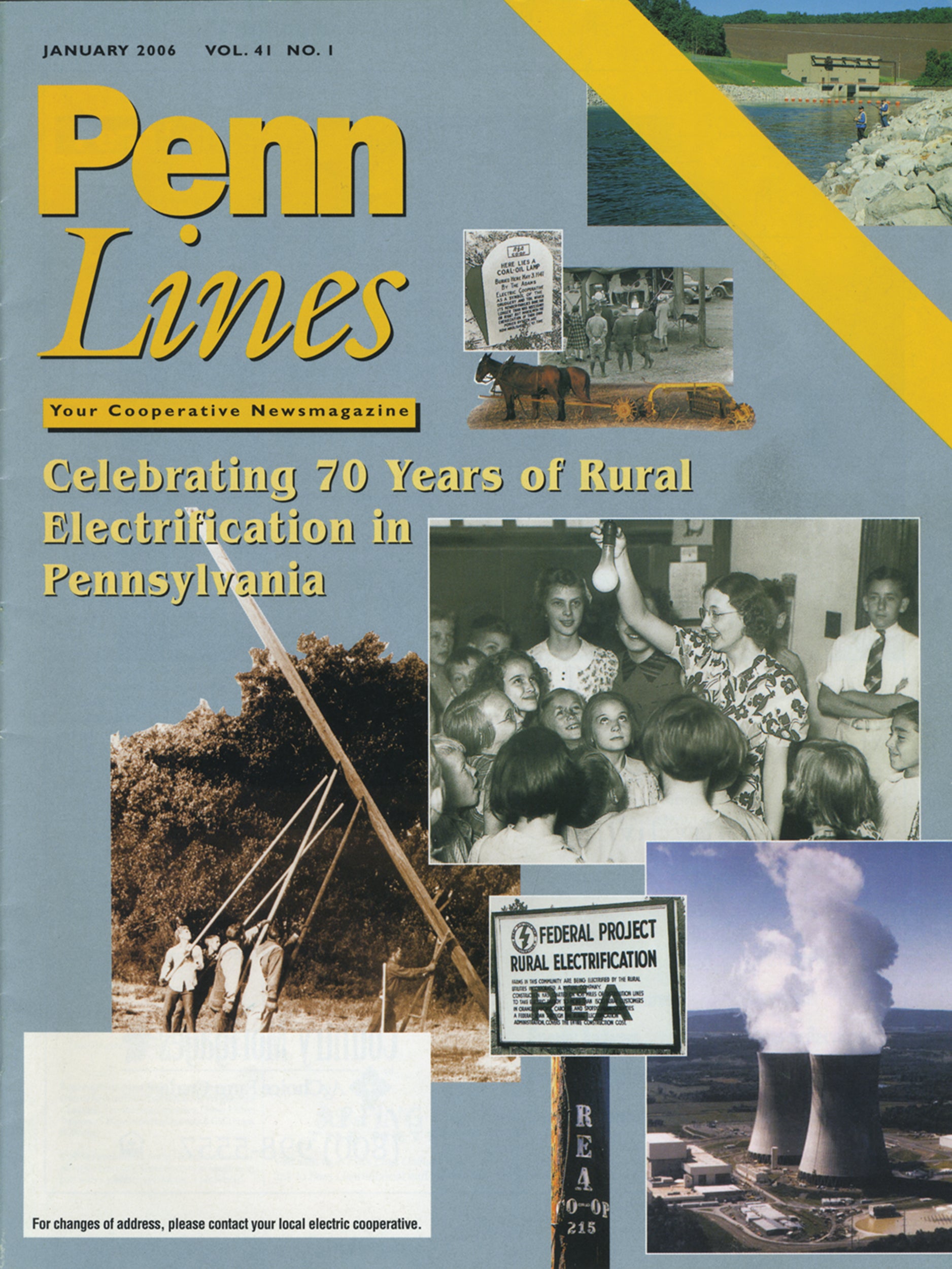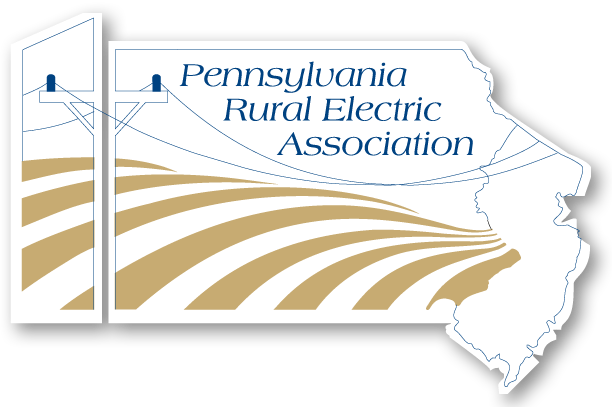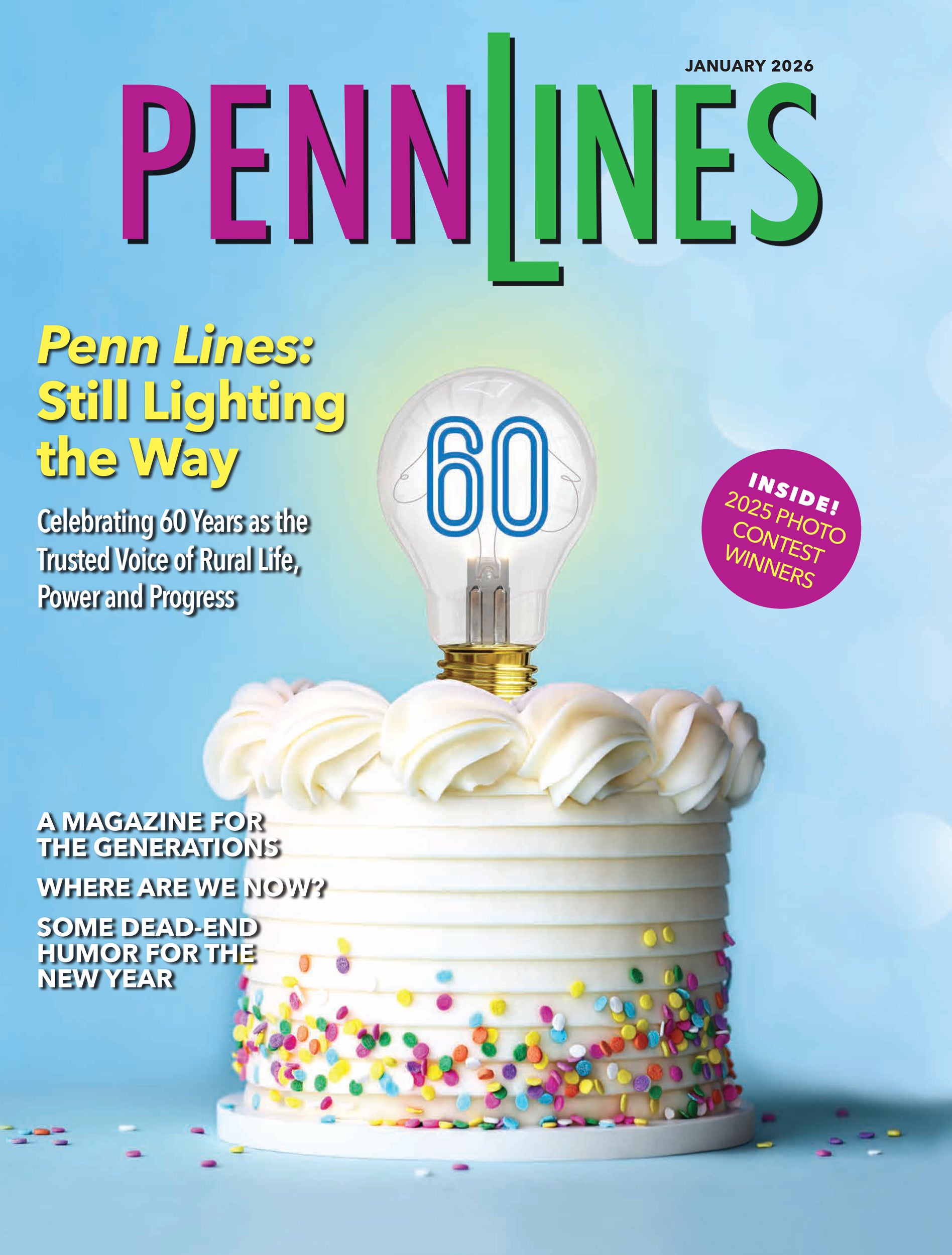News • Ideas • Events
EDITOR’S DESK
The Magazine You Come Home To
As Penn Lines turns 60 this year, it’s been fun to look back at the magazine’s history — and my own time with it. I joined the staff with the January 2006 issue (see cover here), so I’m marking 20 years with Penn Lines this month.
Ten years ago, we celebrated the magazine’s 50th anniversary with a new design in the January issue (see page 7). That year, we also added a tagline to the front cover: “The magazine you come home to.”
The tagline captured what readers had been telling us for years: that Penn Lines was something they grew up with, a kitchen-table constant, and a welcome word from their co-op each month. As we celebrate our 60th anniversary, it’s nice to hear some of those same sentiments echoed by readers in this month’s issue. For many, it’s still the magazine they come home to.
For me, the tagline has always struck a personal note. Although I grew up in central Pennsylvania, our family moved out of state in 1986, the year I graduated from high school. After that, I wasn’t sure I’d ever make it back to the Commonwealth. Over the next 20 years, school, work, and the military took me across the country and around the world. But it was Penn Lines that brought me back home.
When I learned about the job, I was processing out of my U.S. Army service. My former boss liked to joke that he had to go to Afghanistan to find me. I still remember driving from the National Military Medical Center in Bethesda, Md., to Pennsylvania for my interview — the day after our son was born. After several deployments and all that time away, it was a special feeling to come back to a familiar place.
Today, our son is a 20-year-old Penn State student (and a big Penn Lines fan). In many ways, he’s also a reminder of my time with Penn Lines — the magazine I literally came home to. Not everyone gets to leave and come back home, so I’m forever grateful for that opportunity. Thank you.
PETER A. FITZGERALD
EXECUTIVE EDITOR

RED, WHITE AND BLUE
Pa. Farm Show to feature new milkshake flavor as part of 250th celebration
A new milkshake flavor is coming to the Pennsylvania Farm Show – and it has a patriotic twist.
To mark the state’s America250PA celebration, which is tied to the nation’s 250th birthday celebration this year, a blue raspberry milkshake will be on the menu. Combined with two other farm show staples – vanilla (white) and strawberry (red) – the new flavor is designed to highlight the country’s red, white and blue colors.
“Toasting America’s 250th birthday will be thrilling with our special new flight of three patriotic flavors, thanks to our partnership with America250PA and Visit PA,” Pennsylvania Dairymen’s Executive Director Dave Smith said in a statement. “We are proud to commemorate our country’s founding right here in its birthplace of Pennsylvania and equally proud to create a unique America250PA milkshake flight for Farm Show fans.”
The event, which runs Jan.10 to 17 at the Pennsylvania Farm Show Complex, brings about 500,000 visitors to Harrisburg each year. In a nod to the 250th celebration, this year’s theme is “Growing a Nation.”

AMERICA’S MILKSHAKES: To mark the Commonwealth’s America250PA celebration, the Pa. Farm Show will feature a new flavor of milkshake — blue raspberry — to coincide with its typical vanilla and strawberry flavors.
GETTING REAL
TSA to charge travelers without REAL IDs
The Transportation Security Administration (TSA) has a message it wants travelers to hear: Get a REAL ID or pay the price.
Beginning Feb. 1, passengers without an acceptable form of ID, such as a REAL ID compliant driver’s license or a passport, will be charged a $45 fee to get through U.S. airport security.
The added fee covers the cost for passengers to use the Confirm ID system. Traveler will be able to fill out the Confirm ID form and pay the fee online before arriving at the airport or complete the process at the airport. Once approved, the identity verification will be valid for 10 days.
“This fee ensures the cost to cover verification of an insufficient ID will come from the traveler, not the taxpayer,” a TSA official said in a statement. “The security of the traveling public is our top priority, so we urge all travelers to get a REAL ID or other acceptable form of ID as soon as possible to avoid delays and potentially miss flights.”
CAUSING CONCERN
Potentially deadly horse disease detected in Pennsylvania
Pennsylvania horse owners are on alert now that at least three horses here have tested positive for strains of the highly contagious, sometimes fatal equine herpesvirus (EHV) that’s being reported in multiple states.
Pennsylvania’s state veterinarians have been working with state and private veterinarians nationwide to trace exposures and locations of potentially affected horses, the state Department of Agriculture reported recently. The disease has respiratory and neurological forms.
Horses have been diagnosed in a handful of counties, including Clinton, Northumberland, York and Lancaster, where one was euthanized in late November. The outbreak has led to the suspension of rodeos and other equine events.
According to the U.S. Department of Agriculture, symptoms of EHV include fever, nasal discharge, lethargy, swollen lower limbs, hind limb weakness and an inability to maintain balance or rise.
Herpesvirus is easily spread by nose-to-nose or close contact with an infectious horse; sharing contaminated equipment including bits, buckets, and towels; or contact with clothing, hands, or equipment of people who have recently had contact with an infectious horse.
EMS UPGRADES
EMS agencies to receive state funding for training, staff and equipment
The state Department of Health plans to invest $6 million in local emergency medical services (EMS) agencies throughout Pennsylvania for training, staff recruitment and new ambulance equipment.
“Our EMS professionals are a lifeline to Pennsylvanians in their most critical health moments,” Secretary of Health Dr. Debra Bogen said. “This investment will help ensure responders have the resources to meet the unique circumstances they face in every medical emergency.”
TIMELINES
A decade ago, Penn Lines turned 50 years old. The magazine celebrated half a century by doing two things — updating its design and looking back at its five decades of existence. Recalling its history in 2016 meant reiterating what the magazine’s initial goal was when it first launched in 1966: keeping readers up to date on all the matters that impact rural electric cooperatives. As we celebrate 60 years in 2026, rest assured that goal continues to be our highest priority.

Also in this issue


